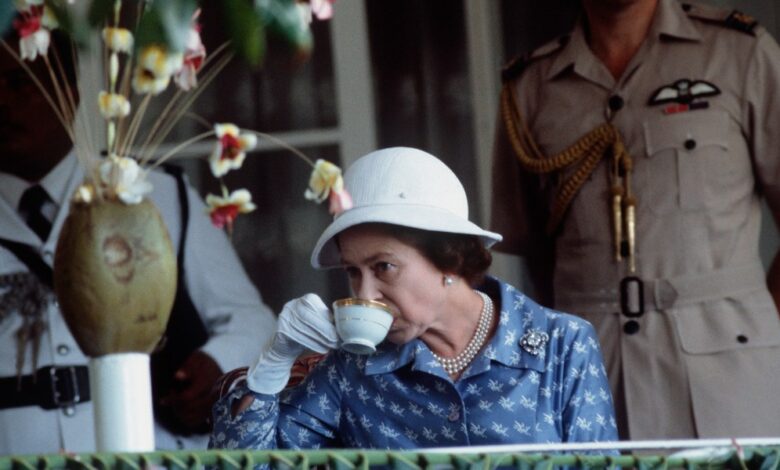Can Gen Z save tea? How young Brits are rekindling their love for the classic cuppa amid a crisis of relevance

In May, the parent companies of two of Britain’s top tea brands reported record sales: Kallo Foods, which owns Clipper Teas, grew 8% to £121.7 million ($155.5 million) in 2023, while Bettys and Taylors, which owns the domestic market leader Yorkshire Tea, saw sales rise 14% to £295.7 million ($375.5 million).
Shortly after, Twinings—another top brand owned by Associated British Foods—reported its highest ever after-tax earnings of £77 million ($97.8 million).
So far, you might say, no surprise there. Everyone knows the British love tea, something George Orwell once described as “one of the pillars of civilisation” in the country.

ullstein bild/Getty Images
But take a closer look and you’ll see this is no ordinary service.
Tea is really popular—the British drink about 36 billion cups in a year, with half the population drinking black tea every day—but consumption has fallen sharply, especially black tea, which has seen its volume decline by 2–3% per year for decades, as the bitter aroma of brewed coffee has increasingly permeated Britain’s high streets.
So does the recent sales bonanza mean it’s tea time again?
Coffee shop quiz
If “builder tea” — black tea, served in tea bags, often mixed with milk, sometimes with added sugar — is making a comeback, the data doesn’t show it.
According to Kiti Soininen, category director, UK Food and Drink Research at market research firm Mintel, “the regular tea bag segment has continued its long-term decline in volume” after a brief hiatus during the pandemic.

John Keeble—Getty Images
This is not surprising if you consider where the market started.
“If you go back to the 1970s, the only hot drink we had was tea. We had instant coffee, but we were a tea-drinking nation,” says Ben Newbury, brand marketing director for Yorkshire Tea at Betty’s and Taylor’s. As the variety and quality of alternative drinks increased, led by but not limited to coffee, the only way forward was down.
But Newbury believes this inevitable incumbent effect has been compounded by a sense of apathy and defeatism within the industry. “A lot of other manufacturers and brands have stopped talking about tea and its benefits,” he says.
Yorkshire Tea is certainly an unusual company, having recently achieved growth in both value (revenue) and volume (number of tea bags sold) of 21% and 12% respectively by 2023.
It did this by increasing its share of the black tea market, which Newbury attributed to its premium positioning in the mass market. In the midst of the cost of living crisis, it turns out, Britons find cutting back on a £5 ($6.35) skimmed coffee more acceptable than cutting a few pence on a bag of tea.
Most other companies reported positive results despite falling trading volumes, with sales rising directly due to price increases due to cost inflation.
Yorkshire is not the only brand to recognise the advantages of being a premium brand, Soininen said, pointing to Tata-owned Tetley launching Golden Brew, and Lipton – the world’s largest tea company, set to be spun off from Unilever in 2022 with more than 30 brands – relaunching its mass-market PG Tips brand in the UK last year with a greater focus on quality.
“Tea is not very popular in the UK because there is a lack of category leadership,” says Gareth Mead, Lipton’s director of corporate communications and sustainability. He points to PG Tips’ new advertising campaign—starring British rapper and actress Ashley Walters, and directed by Sir Steve McQueen, 12 years a slave fame—is their first new campaign in nearly eight years.
“If you want consumers to drink more tea, you need to give them a reason to buy the product… our approach is to reinvest in PG Tips,” said Mead, adding that first-quarter sales were up for the first time in years. “There is a huge opportunity to restore the British love of tea.”
Given the long-term decline in daily tea drinking, it’s a bold claim. But Lipton, like Yorkshire and the wider industry, sees potential for new markets in perhaps surprising places.
Tea Time for Gen Z
London has never had a coffee culture, unlike Paris or Vienna. The traditional silver-serving tearooms have long since given way to stereotypical city street cafes, surviving only as afternoon teas, often held in hidden spots in luxury hotels.

beautiful pictures
But in the past decade, a tea import from Taiwan has revived public tea culture—though Orwell probably wouldn’t have recognized it.
If you stroll along Shaftesbury Avenue in London’s West End, from Piccadilly Circus to New Oxford Street, you’ll pass at least 10 bubble tea shops, selling iced, cold tea in plastic cups, often in fancy colours, with a variety of jellies, popcorn and tapioca pearls. Popular flavours include lychee, taro and winter melon; Darjeeling and Lady Grey are not so much.

Westend61—Getty Images
The customers, who often queue outside on the back streets of Soho, are mostly in their teens and 20s, and they never get bored.
Newbury is under no illusions that young Britons will adopt the tea-drinking habits of their parents or grandparents—a YouGov poll suggests one quarter of people over 60 drink more than 20 cups a week, compared to just 6% of 16- to 24-year-olds—but he sees bubble tea as emblematic of how Generation Z might be drawn to new tea-drinking experiences.
“It’s fascinating, the younger generation is coming to tea. It feels very much like cafe culture. It’s really about theatrics and a personalized treat, similar to having a frappe or a flavored coffee,” he said.
Neither Yorkshire nor Lipton are directly involved in bubble tea or pearl tea—currently estimated to be $2.6 billion global market, growing by more than 7% annually—but both have adopted ways of drinking tea that would have been unimaginable just a few decades ago.
Mead points to Lipton Cold Infuse (a tea designed to be brewed cold rather than iced: Lipton Ice Tea is a completely separate entity, still a joint venture between Unilever and Pepsico) and Tazo brand tea concentrates, which have seen particular growth in France and the United States.
“There was an image problem. If you Google Gen Z and tea, you’d have trouble. You’d see relatively old people looking off into the distance, dreamily. It was a personal moment of fun, which was great, but very different from the powerful, existential energy of coffee,” Mead explains.
Beyond variety, appeal and novelty, he added, tea’s opportunity for Gen Z comes from its alignment with two big trends: wellness (tea has many proven health benefits, including high levels of polyphenols and flavonoids, which are beneficial for the heart) and sustainability (tea is minimally processed and very light, so has a relatively small ecological footprint).
“Gen Z isn’t a regular tea drinker, but they’re more interested in it than any other generation,” he said. “This is something we should be very excited about as an industry. Our mission as the world’s largest tea company is to help people rediscover tea, in whatever form suits their needs. There’s no reason it can’t be cooler than coffee.”
Diversification and internationalization
Teas advertised as having health benefits have become a standout in the category in recent years, with 19% of new launches in the UK making some sort of “functional” claim, many of which relate to reducing stress or improving sleep, according to Mintel’s Soininen.
“Tea is the ultimate elixir. It can get you out of bed. It can be there for conversation. Or for some people, it’s what they drink before bed.”
Ben Newbury
Lipton’s Pukka brand, which specialises in herbal teas, has spread from the UK to the world, while Yorkshire recently launched a caffeine-free herbal tea and even Yorkshire Tea Kombucha.
In addition to reaching Gen Z, this is part of a broader product diversification trend as businesses develop tea products or brands to cater to different segments—whether different groups, needs, or even times of day.
“Tea is the ultimate elixir. It can get you out of bed. It can be there for conversation. Or for some people, it’s what they drink before bed,” says Newbury.
Reflecting this need to hit multiple targets, Yorkshire is part of a group that includes premium specialty tea business Taylors of Harrogate, as well as Taylor’s Coffee and Betty’s Tea Rooms. Lipton’s portfolio, on the other hand, includes its eponymous brand (a bestseller in 150 countries) as well as PG Tips, Pukka, Tazo’s fruit and spice teas and T2’s premium tea blends and fine teaware, aimed at the luxury gifting market.
Another strategy is to diversify outside the UK. After all, unlike the UK, the global home tea market – worth $127 billion by 2024, according to Statistical—is growing at a compound annual growth rate of 6%.
Lipton has been doing this for a long time. Now based in the Netherlands, the Glasgow-founded flagship brand is no longer sold in the UK. But family-owned Yorkshire is also aggressively targeting sales in growth markets abroad. “They’re making lattes with Yorkshire Gold in some parts of China,” says Newbury.
British tea culture still has appeal around the world and is still significant at home. Will it ever be the same? the daytime drink, and a pillar of civilization? Unlikely. Orwell’s time is over, for better or worse.
But can it survive and start growing again? Yes. Like anything else, it is evolving and it is the businesses that recognise this and grow with it that will ultimately succeed.




